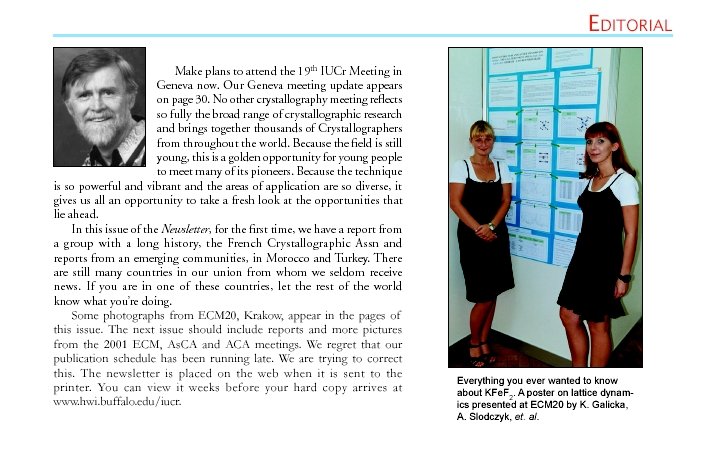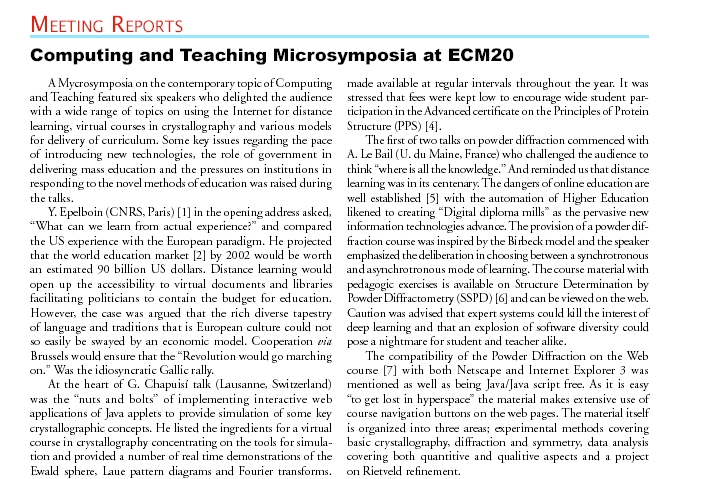
Ferreira M. M. C., Kiralj R., A Combined Structural, Quantum Chemical
and Chemometric Study on Aromatic Bond Lengths in Crystals of
Nucleosides. Kraków, Poland, 25-31/08/2001: 20th European
Crystallographic Meeting, Book of Abstracts, 314 (2001). Poster
S9.M3.P2.
Right below are some electronic documents related to the conference.
Information about ECM-20, Krakow, 2001, in IUCr Newsletter 9(4),
2002,
available at http://www.iucr.ac.uk
or http://www.iucr.org.




Information about the conference in the Newsletter of the International
Relations Center of the Jagiellonian University, No. 16, Autumn 2001, available
at:
http://www.uj.edu.pl/IRO/NEWSLET/IRO16/ECM20.html
http://www.uj.edu.pl/IRO/NEWSLET/

20TH
EUROPEAN CRYSTALLOGRAPHIC MEETING (ECM 20):
CRYSTALLOGRAPHY
IN NATURAL SCIENCES AND TECHNOLOGY
(KRAKÓW,
25 - 31 AUGUST 2001)
The role of crystallography in physics, chemistry, geology and biology is well-established. Crystallography provides a very profound insight into the structure of solid matter. Thanks to it we can examine three-dimensional shapes of the molecules and their mutual arrangement, intra- and intermolecular interactions and relationships between the structure and properties of chemical compounds in a crystalline state. Recent progress in understanding the nature of chemical bonds, life processes and the function of drugs, as well as in designing new materials, would not be possible without the development of crystallography.
Crystallographers are a very active group of scientists organised within International Union of Crystallography (IUCr) and within continental associations. One of them is the European Crystallographic Association (ECA). IUCr Congresses are held every three years while the continental meetings take place in between. ECA consigns the organisation of ECM to distinguished crystallographic centres, which have to compete for this honour, sometimes for several years.
The 20th European Crystallographic Meeting was organised by crystallographers from the Jagiellonian University in collaboration with scientists from Stanisław Staszic University of Mining and Metallurgy (AGH). ECM 20 was held in the buildings of the Faculty of Chemistry and the Institute of Physics of the Jagiellonian University, the University of Mining and Metallurgy and the Pedagogical Academy. ECM 20 itself, though formally European, hosted 720 participants from all over the world. The list of members of the Programme and Organising Committees of ECM 20 is given in an appendix.
ECM 20 was accompanied by a training on the Symmetry of Crystals, two workshops (Twinning in Chemical Crystallography and Structure Solution from Powder Diffraction Data) and seven satellite pre- and post-conference meetings, which all together gathered 620 additional participants. The satellite meetings that have already been held are: International Symposium on Organic Crystal Chemistry (Poznań-Rydzyna) chaired by Prof. Teresa Borowiak, International Symposium on Synchrotron Crystallography (Krynica-Czarny Potok) chaired by Dr hab. Jacek Grochowski, International Seminar on Inclusion Compounds (Warszawa-Popowo) chaired by Dr Kinga Suwińska, International Conference on Liquid Crystals (Zakopane-Kościelisko) chaired by Prof. Jerzy Zieliński, Protein Crystallography beyond 2000: High Throughput and High Quality Control (Krynica - Czarny Potok) chaired by Drs Szymon Krzywda and Krzysztof Lewiński, Aperiodic Structures (Krynica) chaired by Prof. Janusz Wolny. The seventh meeting, the 5th International Conference on X-ray Investigation of Polymer Structures (XIPS'2001), will be organised by Prof. Andrzej Włochowicz in Bielsko-Biała in December 2001.
The scientific programme of ECM 20 covered a wide range of disciplines concerning various aspects of crystallography and their applications. The programme included 15 plenary lectures delivered by best experts in the following fields: "Foundations, history and future of crystallography", "Crystallography in chemistry", "Crystallography in physics", "Crystallography in materials science and mineralogy", "Crystallography in biology, medicine and pharmacology", "New instrumentation and measuring methods", "New developments in theoretical and experimental approach to structure solution". During the five working days of ECM 20, the participants could attend 59 microsymposia followed by two poster sessions, each lasting two days. The topics of five to six oral presentations, which made up each microsymposium, covered the subjects of the 11 Special Interest Groups (SIGs) of ECA as well as other important and dynamically developing areas of crystallography. The Special Interest Groups were: Macromolecular Crystallography (SIG_1), Charge, Spin and Momentum Density (SIG_2), Aperiodic Crystals (SIG_3), Electron Crystallography (SIG_4), Mineralogical Crystallography (SIG_5), Instrumentation and Experimental Techniques (SIG_6), Molecular Interaction and Recognition (SIG_7), Powder Diffraction (SIG_8), Crystallographic Computing (SIG_9), Diffraction Physics and Optics (SIG_10), Extreme Condition (SIG_11) organised 48 microsymposia whereas Other Groups were responsible for organisation of 11 remaining microsymposia. The most recent scientific results were displayed in the form of 400 poster presentations, which raised lively and fruitful discussions and enabled young crystallographers to acquaint themselves with their more experienced and distinguished colleagues.
During the ECM 20 Opening Ceremony on Saturday 25th August at the Philharmonic Hall, the ECA Prize (the second in its history) was offered to Prof. Jochen R. Schneider from HASYLAB at Deutsches Elektronen-Synchrotron DESY, Hamburg, who delivered a special lecture "Investigating Condensed Matter with 0.01 nm X-rays".
Other categories of prizes were awarded to the young authors of the best posters. Three prizes were offered by Cambridge Crystallographic Data Centre (CCDC) for outstanding achievements in the field of chemical crystallography. The four best posters of the most popular microsymposia ? Intermolecular Interactions, Structure Determination from Powder Data, Structure and Properties of Inorganic Compounds ? were recognised with prizes from the ECM 20 Organisers.
In order to enable PhD students and young scientists to take part in ECM 20, IUCr and ECA offered special awards called Student Packages to 74 and Bursaries to 31 participants. The local Organisers also helped to sponsor a group of 25 students and research workers.
Throughout the meeting, a commercial exhibition of scientific equipment related to crystallography as well as a display of books and journals covering various crystallographic fields were held.
The social programme of ECM 20 was rich and consisted of more and less solemn events. After the Opening Ceremony, the welcome reception was arranged in the courtyard of Collegium Maius. On Sunday, 26 August, an organ concert was performed by Andrzej Białko. An outdoor get-together party was organised on Monday evening at Pasternik, while on Tuesday all the younger participants had chance to meet at the Rotunda Academic Culture Centre to learn Polish folk dances. Wednesday was a day of excursions and of the Farewell Banquet which was held in Royal Castle in Niepołomice.
Soon after ECM 20, we received many letters of congratulation. They often repeated that the meeting was very well organised and combined good science with fascinating events in a beautiful city.
Katarzyna Stadnicka
Barbara Oleksyn
Members of Organising
Committee of ECM 20
Appendix
Programme Committee
Chair: S.A. Hodorowicz (Poland), ECA Representatives:
P. Beurskens (Netherlands), P. Paufler (Germany), Co-ordinating Members:
J. Grochowski (Poland), M. Jaskólski (Poland), T.M. Krysgowski (Poland),
J. Lipkowski (Poland), K. Łukaszewicz (Poland), H. Morawiec (Poland), B.J.
Oleksyn, A. Pietraszko (Poland), K. Woźniak (Poland), Chairs of Special
Interest Groups: P. Becker (SIG_2), G. Ferraris (SIG_5), G. Gilli (SIG_7),
C.J.Gilmore (SIG_4), J. Helliwell (SIG_6), T. Janssen (SIG_3), M.V. Kovalchuk
(SIG_10), E. J. Mittemeijer (SIG_8), A.L. Spek (SIG_9), K. Wilson (SIG_1):
Chairs of Satellite Meetings: T. Borowiak (Poland), J. Grochowski (Poland),
S. Krzywda (Poland), K. Suwińska (Poland), A. Włochowicz (Poland), J. Wolny
(Poland), J. Zieliński (Poland)
Organising Committee
S. A. Hodorowicz - Chairman, W. Łasocha - Secretary,
B. Borzęcka - Prokop, M. Ciechanowicz- Rutkowska, J. Grochowski, S. Komornicki,
K. Lewiński, M. Michalec, W. Nitek. A. Olech, B.J. Oleksyn, P. Serda, W.
Sikora, K. Stadnicka, A. Szytuła, J. Śliwiński, J. Wolny.
Special thanks are due to the PhD students of
the Faculty of Chemistry who helped the Organising Committee in many ways.